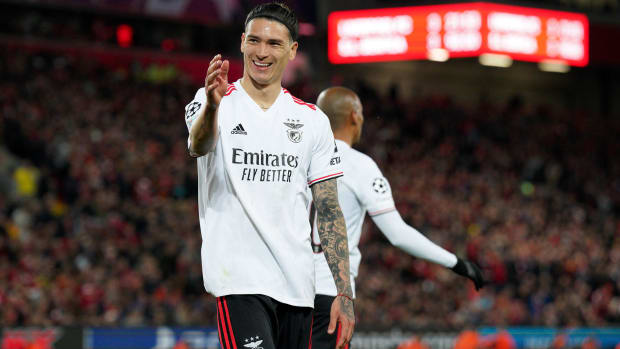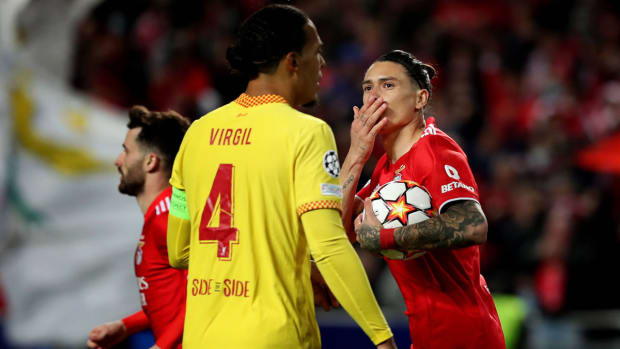As Liverpool’s star forwards age or head elsewhere, the club needed to reload to keep pace in the upper echelon, and the Uruguayan rising star fits the bill.
View the original article to see embedded media.
There was a moment in the final minutes of the Champions League final in Paris, as Liverpool thudded fruitlessly away at Real Madrid’s defense, when it suddenly seemed that a ceiling might have been hit. Jürgen Klopp and Liverpool have done an extraordinary job in just about keeping pace with Manchester City, despite a net transfer spend of around $500 million less than its chief Premier League foe over the past six years, but perhaps this was it.
The great front three is aging and beginning to break up. The lack of creative guile in midfield had been exposed by the insistence on playing Thiago Alacântara when he was far from fully fit. And there was a sense of weariness, which was probably down to having played the maximum possible number of games that season, but contained also the hint of an end-of-empire staleness. Despite all the sustained success, it marked a third final in which Liverpool failed to score.
When Sadio Mané then revealed his reluctance to sign a new contract—his is up at the end of next season—Liverpool seemed in an extremely tricky position, particularly with Michael Edwards, who had headed up the extremely successful transfer department, moving on. Mohamed Salah’s contract also expires next summer, and neither is paid anything like he would be at another major club. With Roberto Firmino also over 30, also out of contract after next season and with his form wavering, it was clear there was work to be done in rejuvenating a squad that was in danger of growing old together. Bringing in Diogo Jota for the 2020-21 season was a start, and adding Luis Díaz in January was a significant follow-up move, but it was clear Liverpool needed something more, especially as Man City loads up with Erling Haaland. And that’s why the signing of Darwin Núñez, announced by Benfica on Monday, feels so significant.

Peter Byrne/PA Images/Imago Images
The slight air of disappointment around Liverpool had begun to dissipate with the open-top bus tour at the end of the season. After all, having fallen narrowly short in both the Premier League and Champions League, it did win both domestic cup competitions last season. And if there was a sense of weariness in the Champions League final, if Díaz against Real Madrid fell short of the standard he had set earlier in the season, none of that was necessarily terminal.
But the arrival of Núñez for an initial fee of about $80 million—that figure could rise to over $100 million—goes further, as it could make Núñez the fifth-most expensive signing ever by a Premier League club after Jack Grealish (to Manchester City), Romelu Lukaku (to Chelsea), Paul Pogba (to Manchester United) and Harry Maguire (to United). It demonstrates a club that already had plans in place, that had anticipated the need to replace its forward line. If Mané and Takumi Minamino end up being sold, coupled with Divock Origi being released, that should cover at least two-thirds of the cost to pry the prolific striker from Benfica.
That, in turn, speaks of a club with a sensible business plan. Minamino may not have been the success it was hoped he would be when he arrived for $9 million in January 2020 but, despite starting only 30 league games for Liverpool, his value has risen.
And while any transfer is a risk, Núñez looks like a good fit for Liverpool. He turns 23 at the end of June and scored 26 goals in 24 league starts last season, to go with six goals in the Champions League (two of which came against Liverpool in the quarterfinals). He is quick, tough and imposing, more than happy to engage in physical duels with defenders. In that sense, he is very different from Firmino, whose role he will essentially fulfill. But he is extremely adept at pulling wide and dragging central defenders out of position, exactly what Liverpool needs a forward to do to create spaces for Salah and Díaz. There have been times for Benfica when he has played on the left of a front three, which means there could be times when he plays alongside Firmino as a direct replacement for Salah.
And that represents an evolution. Liverpool is a big team anyway, but Núñez offers an even greater threat from set plays. He has a capacity for work and is brave to the point of recklessness. That does not necessarily mean he will be able to follow a Klopp pressing schema, but if he is unable to do so, it will not be for want of effort.
“Good, really good I have to say,” Klopp said in his assessment of Núñez after one of Liverpool’s quarterfinal meetings with Benfica earlier this year. “He played pretty much in front of me with these tough battles with [Ibrahima] Konaté, physically strong, quick. Was calm around his finish, when he finished the goal off was really calm. Good, really, really good. So, obviously in these situations, if he stays healthy, it’s a big career ahead of him.”

Pedro Fiuza/NurPhoto/Imago Images
Now that can unfold under Klopp’s watch, with the manager having extended his stay until 2026. Given how quickly Núñez has adapted, though, first from Peñarol in his native Uruguay to Almería in Spain, and then from Almería to Benfica, improving rapidly all the time, there should be little doubting his appetite or his capacity to learn. Perhaps his first touch isn’t quite as silky as it could be, and the stats show a tendency to lose possession, but given his role will primarily be to maintain Liverpool’s intensity, that perhaps isn’t overly important.
Núñez is a very bright prospect who is developing very quickly. While Man City can buy near-finished products like Haaland, Liverpool has to gamble to an extent (the fee may be greater, but the wages are much lower). Núñez is the sort of player it needs to sign. And in the very short term, an exciting signing is exactly what was needed to refocus minds and end fears that everything was just beginning to drift.
More Soccer Coverage: